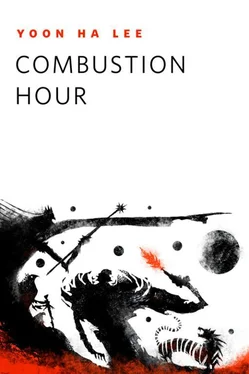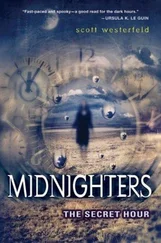Юн Ли - Combustion Hour
Здесь есть возможность читать онлайн «Юн Ли - Combustion Hour» весь текст электронной книги совершенно бесплатно (целиком полную версию без сокращений). В некоторых случаях можно слушать аудио, скачать через торрент в формате fb2 и присутствует краткое содержание. Город: New York, Год выпуска: 2014, ISBN: 2014, Издательство: Tor Books, Жанр: Фантастика и фэнтези, short_story, на английском языке. Описание произведения, (предисловие) а так же отзывы посетителей доступны на портале библиотеки ЛибКат.
- Название:Combustion Hour
- Автор:
- Издательство:Tor Books
- Жанр:
- Год:2014
- Город:New York
- ISBN:978-1-4668-7502-9
- Рейтинг книги:5 / 5. Голосов: 1
-
Избранное:Добавить в избранное
- Отзывы:
-
Ваша оценка:
- 100
- 1
- 2
- 3
- 4
- 5
Combustion Hour: краткое содержание, описание и аннотация
Предлагаем к чтению аннотацию, описание, краткое содержание или предисловие (зависит от того, что написал сам автор книги «Combustion Hour»). Если вы не нашли необходимую информацию о книге — напишите в комментариях, мы постараемся отыскать её.
This short story was acquired and edited for Tor.com by Tor Books executive editor Patrick Nielsen Hayden.
At the Publisher's request, this title is being sold without Digital Rights Management Software (DRM) applied.
Combustion Hour — читать онлайн бесплатно полную книгу (весь текст) целиком
Ниже представлен текст книги, разбитый по страницам. Система сохранения места последней прочитанной страницы, позволяет с удобством читать онлайн бесплатно книгу «Combustion Hour», без необходимости каждый раз заново искать на чём Вы остановились. Поставьте закладку, и сможете в любой момент перейти на страницу, на которой закончили чтение.
Интервал:
Закладка:
The Jewel of Mirrors is a lock of twisting logic upon a starship’s carcass. If you remove the lock, the starship will rouse, and with it all its nine-and-twenty cannons, one for each bitter star in your world’s home constellation. The difficulty is not the lock, it’s preserving the astrology of oppression.
The Jewel of Mirrors is a painting upon glass by the only artist to retrieve colors from outside the world-tapestry. Colors like crimson and bronze and viridian . Its virtue is that you can look into the painting and find a portrait of yourself. Its curse is that you can never unsee what you have seen there.
You would much rather be studying intelligence on the philosopher-king than some gaudy gem wrapped up in folklore. But all you know is that he has given tribute dutifully year by year to keep the queen’s rapacious eye from turning in his direction. Indeed, some of those treasures decorate the queen’s throne room. Frogs composed of gears imperfectly meshed, who sing dolorous songs of ruination. Banners upon which eddies and curves of light depict thunderstorms, cyclones, the occasional stray dragon. Once, a lily with eyes blinking stutteringly in its petals. This one was not entirely successful: the queen liked the idea, but suspected the eyes of belonging to the philosopher-king’s sages or spymasters. Even now no one is certain how she disposed of the thing.
Before this day you knew the philosopher-king owned the Jewel of Mirrors, or at least, you knew that everyone said he did. You hadn’t expected the story to be put to the test. And for that matter, how is a necklace or a starship unlocked or a painting supposed to address the problem of the lanterns?
Although you could ask the queen, it’s unlikely that she would answer. It’s more likely that you will find out when everyone else does.
Logistics becomes easy when everything from tinned dehydrated meals to space suits collapses into darkness, and can be reconstituted as neatly as an ancient theorem. For this mission the queen has assigned you the greatest of her warships, the starscourge Stormrose . All the queen’s ships are named after flowers.
For most of her wars the queen accedes to her soldiers’ sensibilities and sends them out by foot, or sometimes in chariots drawn by horse or swan or slow-blinking lizard. This way they can breathe, in the way of shadow moving through an atmosphere of light. And this way they need not endure the starships’ claustrophobic nightcage.
The Stormrose , concocted of feral triangles and claw-projections, overgrown with guns, gives no hint as to its contents. No holes have been cut into it for people to look out of. It’s a single connected silhouette, representing massacre in the semiotics of inkblots.
The queen has come to the starport to see you off. There is a black arc above you both, and cut into it are diamonds, stars, ringed planets, the occasional prismatic flicker of meteorites flashing by. The tiger at the queen’s side sits back on its haunches and regards one of the diamonds as though it were prey for winter nights.
“My liege,” you say as you bow before the queen.
Her smile, you imagine, is every bit as sardonic as the one that you hide inside your heart. “I know that I cannot command you as I do the others,” she says, “no matter how disagreeable you find my presence. Nevertheless, good service is good service, and should be recognized as such. I expect nothing less of you now.”
The queen taps your shoulder with the scepter. Long practice: you don’t shudder as your shape is joined to hers, shadows merging for a moment. You don’t need the reminder, but the ritual has to be observed, even if you are the one person who has nothing to fear from the scepter. “Go,” she says. “Bring the jewel back to me.”
It won’t be the only thing you bring. Neither of you needs to say it, though.
A law of etiquette in the world of puppets: You may gesture, you may intimate, but you do not touch. You do not intersect shadow upon shadow, especially when the shadow is a person. Even lovers exchange their caresses through some intermediary: handkerchiefs of filigree lace, tangram poetry, perfectly useless masks. To touch is to become conjoined. It is not something you do where you can be seen, and everything on the world-tapestry can be seen.
The queen with her scepter is one exception. Not only does she touch people with it, she also commands them. It is not entirely accurate to call it a scepter. Rather, it is a rod of puppet-strings, condensed to hungry facets. You have never seen your string, but you can feel it like a flickering ember even when you are far from the queen’s presence. Doubtless her other subjects experience something similar.
The other exception is travel in conveyances: carriages that admit no windows, submarines scarred by battles with gnashing kraken, starships like the one that you will command against the philosopher-king. Leisurely journeys, foregoing such vehicles, are fashionable for a reason.
Another law of etiquette in the world of puppets: you do not speak of the ligatures fraying, of the paper shedding its fibers and the limbs worn thin, of the scalloped edges after encounters with water. (After fire, water is the element that puppets fear most. Glue is not well-regarded, either.) You do not speak of the fact that the queen’s favorite tiger smells incongruously of tangerines and cloves and amber after a mishap with a perfume bottle, or the stiffness of the queen’s hands, which she makes no attempt to disguise, and which no one is foolish enough to remark on. Everything is smoothed over by shadow.
This is probably the only reason nobody asks how it is that you are char-marked, fire-scarred, and whole of form; how you survived.
We are the Stormrose . Within this warship’s boundary crenellations, we are one weapon and one will. A single burnt knight stands apart; but the knight’s mission is ours, and in any case it is not for us to question the queen’s dictate.
In times unwritten, we have punched holes like arpeggiated quavers into crowds that flee, but never fast enough. We have called down fire as sudden as cardiac failure upon citadels new-crowded with ghosts. We have cultivated flowers whose radiations exhale calligraphy-splashes onto the threadbare cloth.
In times unwritten, there were no graves and no pyres, no corpses and no epitaphs, only bland expanses of background fabric where shadows once moved. Our orders this time are different. So the queen said. So the knight says now.
The ship breathes with one breath, strikes with one hand. At some later time we may disembark and become individuals again. We will not concern ourselves with this until it becomes necessary.
We do not know what the knight thinks of this, except that this is a familiar story to it, possibly unworthy of special attention. We do not ask.
It’s not a coincidence that the knight has a gun the way the queen has a scepter.
On the last day that his capital stands, the philosopher-king sets free his flocks of origami birds, crane and goose and extravagant peacock. He sends all his servants home, and persuades the courtiers and guards and alchemists to follow them. The guards, like the soldiers, may keep their weapons, but he makes it plain, without words, that those weapons are unlikely to bring them any profit. The great towers of the palace fold in upon themselves so that the band of sky with its cloudscatter and raindrift can be seen without obstruction. The Stormrose , too, can be seen as it eclipses the cut-out sun in its descent.
Then the philosopher-king sits in his study and writes. He writes upon a shadow-book with shadow-pages, incising words of light like the bite marks of didactic snakes. For years he has been adding oddments of lore, fragments of story: everything he has heard about the Jewel of Mirrors, including a few divertissements of his own.
Читать дальшеИнтервал:
Закладка:
Похожие книги на «Combustion Hour»
Представляем Вашему вниманию похожие книги на «Combustion Hour» списком для выбора. Мы отобрали схожую по названию и смыслу литературу в надежде предоставить читателям больше вариантов отыскать новые, интересные, ещё непрочитанные произведения.
Обсуждение, отзывы о книге «Combustion Hour» и просто собственные мнения читателей. Оставьте ваши комментарии, напишите, что Вы думаете о произведении, его смысле или главных героях. Укажите что конкретно понравилось, а что нет, и почему Вы так считаете.












